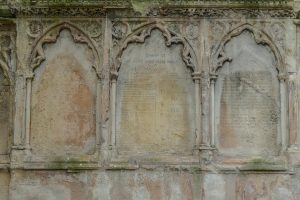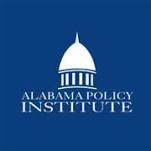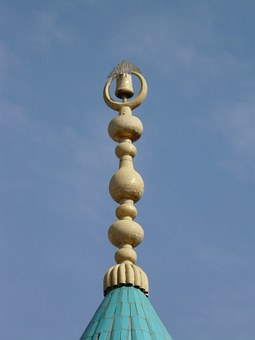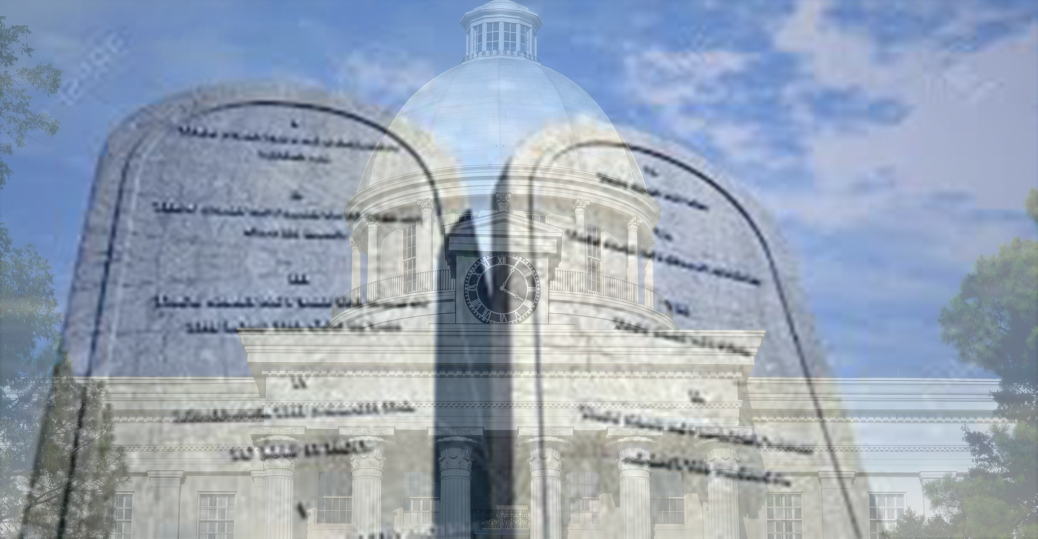Alabama voters will go to the polls on November 6. In addition to the general election there are four (4) important Constitutional Amendments that will appear at the end of the ballot. These amendments should be studied in advance of election day to be sure that you understand the effect of your voting choice – yes or no – and how it may affect your freedom of religious expression in your home state.
Please take the time to study these amendments before you vote.
 Proposed Amendment #1 is destined for controversy as it deals with freedom of religious expression and the display of the Ten Commandments.
Proposed Amendment #1 is destined for controversy as it deals with freedom of religious expression and the display of the Ten Commandments.
The New York Times has taken interest in Alabama and political efforts to promote this amendment, following and writing about special interest groups around the State as they campaign for passage of Amendment #1. The NY Times interest seems to be driven by the link between public displays of the Ten Commandments and the curiosity of the infamous former Supreme Court Justice Roy Moore, as could woefully be expected.
Former Justice Moore has attracted a bright spotlight of media attention to Alabama, bringing scrutiny, and a dose of intellectual ridicule to our fair state. For some political pundits this proposed legislation may be forever known as the Roy Moore Amendment.
According to a recent article in Yellowhammer News:
“The amendment’s core supporters hope the amendment passes not just on its merits but because of the seemingly-automatic response from the left – a legal challenge that ends up in federal court proceedings. According to The New York Times, which covered a pro-Amendment One rally in McIntosh, AL, on Saturday night, “those campaigning for it now say their goal is to get a case before Supreme Court, where they hope — if a Justice Kavanaugh is on the bench — a conservative majority will rule in favor of such displays.”
“It is the kind of legal fight that social conservatives had been looking forward to having, in front of a Supreme Court realigned by President Trump,” The New York Times noted.
This echoes recent comments made by Associate Justice Tom Parker, a longtime Roy Moore ally and the current Republican nominee to be the state’s next chief justice.”
 According to the Alabama Policy Institute:
According to the Alabama Policy Institute:
“To be sure, this amendment brings yet again to the public eye an issue that some consider settled. The Supreme Court precedent will––new rulings notwithstanding––supersede any constitutional amendments the people of Alabama pass or fail to pass on the subject. If the U.S. Supreme Court were to, however, overturn past precedent, the success or failure of this amendment could be consequential.”
“This amendment, as expected, has received its share of support and criticism.
Even so, Alabamians have never actually gotten a chance to vote directly on the issue.
Dean Young, Chairman of the Ten Commandments PAC, suggests this to be a vote where Alabama decides if we “want to acknowledge God”. He also remarks that we will be held accountable for our vote on judgment day.
Not all Christians agree with Young, however. The Baptist Joint Committee, for example, argues that “the government should represent all constituents regardless of religious belief” and not involve itself in “religious favoritism”.”

This Writer urges voters to be cautious when deciding how to vote on this issue. Opening the door to displays of religious symbols on public property, such as the grounds of the State Capitol or the Rotunda of the Alabama Supreme Court Building, given the society we find ourselves living in today, opens doors that may allow in much more than you may have expected or ever anticipated. It is not a simple choice that you are presented with. When the test case comes and one religious display is allowed, you can be sure that many other displays will be allowed also. There can be no favoritism, bias, or discrimination shown by the State.
When the Pilgrims landed at Plymouth Rock in 1620 and founded the Jamestown Colony, the first settlement of “Immigrants” in this country, one of the reasons they made the arduous journey here was to escape religious persecution, if you recall your earliest seeds of history education from elementary school. The Church of England was controlled by the State, or the English Crown. There was no separation between the State and the Church and the Pilgrims were seeking new liberties, including the freedom to practice their religion without interference (or legislation) from the government. It is best for everybody when the government stays out of religious affairs.
My point is simple and straight forward. Our Forefathers abandoned England, declared their independence, defeated an overwhelming military force, struggled to hammer out an ingenious Constitution, and adopted an innovative and enduring tri-cameral system of self government for good reason and at great cost to themselves.
As the beneficiaries of our ancestors solemn efforts it is our duty to remain forever vigilant and to resist efforts to re-connect Church & State, even when they seem well purposed. For me I believe that we honor our God when we protect our Country and its founding principles, and in upholding that honor there lies no rebuke of our faith.
A Constitutional Amendment authorizing the display of a religious symbol on public property is a step in that wrong direction. Better that the Constitution of Alabama remain silent on the issue.
Good people are just plain wrong sometimes when it comes to politics.
***********************
The following is provided from the Alabama Secretary of State John H. Merrill’s Office and the Fair Ballot Commission:

BALLOT STATEMENT FOR STATEWIDE AMENDMENT #1
Proposed by: Act 2018-389 (Senate Bill 181 of the 2018 Regular Legislative Session)
Bill Sponsor: Senator Dial
Cosponsors: None
“Proposing an amendment to the Constitution of Alabama of 1901, providing for certain religious rights and liberties; authorizing the display of the Ten Commandments on state property and property owned or administrated by a public school or public body; and prohibiting the expenditure of public funds in defense of the constitutionality of this amendment.
Proposed by Act 2018-389.
This description shall be followed by the following language:
Yes ( ) No ( )”
(2) A summary of and the text of any implementing legislation directly related to the statewide ballot measure:
There is no implementing legislation for this statewide ballot measure.
(3) The placement of the statewide ballot measure on the statewide ballot:
This proposed Constitutional Amendment will appear on the Ballot after election of statewide and local offices and will be the first constitutional amendment for voter consideration. The proposed Constitutional Amendment will be listed as “Statewide Amendment 1“.
(4) A plain language summary of the statewide ballot measure, which shall include, at a minimum, the legal or constitutional authority for its passage, the effect of the statewide ballot measure if it is passed, including its cost and source of funding, and the effect of the statewide ballot measure if it is defeated.
Under current law, the state constitution contains no language related to the display of the Ten Commandments.
Amendment 1 does two things. First, it provides that a person is free to worship God as he or she chooses, and that a person’s religious beliefs will have no effect on his or her civil or political rights. Second, it makes clear that the Ten Commandments may be displayed on public property so long as the display meets constitutional requirements, such as being displayed along with historical or educational items. Amendment 1 also provides that no public funds may be used to defend this amendment in court.
WHAT IS THE EFFECT OF A YES VOTE:
If a majority of voters vote “Yes” on Amendment 1, the state constitution will provide that a person is free to worship God as he or she chooses and that a person’s religious beliefs will have no effect on his or her civil or political rights. It will also provide that the Ten Commandments can be displayed on public property so long as the display meets constitutional requirements, such as being displayed along with historical or educational items.
WHAT IS THE EFFECT OF A NO VOTE:
If a majority of voters vote “No” on Amendment 1, no language related to the display of the Ten Commandments would be included in the state constitution.
There is no cost for Amendment 1.
No public funds may be used to defend this amendment in court.
The Constitutional authority for passage of Amendment 1 is set forth in Sections 284, 285 and 287 of the State Constitution. These sections outline the way a constitutional amendment may be put to the people of the State for a vote.
DISCLAIMER: ANY OPINIONS EXPRESSED IN THIS ARTICLE ARE SOLELY THE VIEWS OF THE AUTHOR AND ARE NOT NECESSARILY THE VIEWS OF THE BIBB VOICE OR ITS EDITORIAL BOARD. YOUR COMMENTS ARE WELCOME AND INVITED. SCROLL DOWN TO THE COMMENTS SECTION BELOW TO LEAVE YOUR MESSAGE OR SEND US A PRIVATE EMAIL VIA EDITOR@BIBBVOICE.COM

















[…] AMENDMENT ONE (TEN COMMANDMENTS) […]